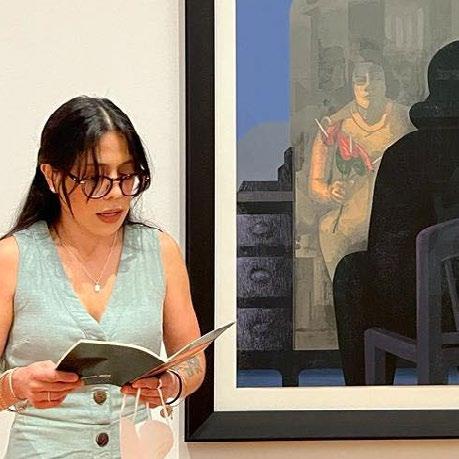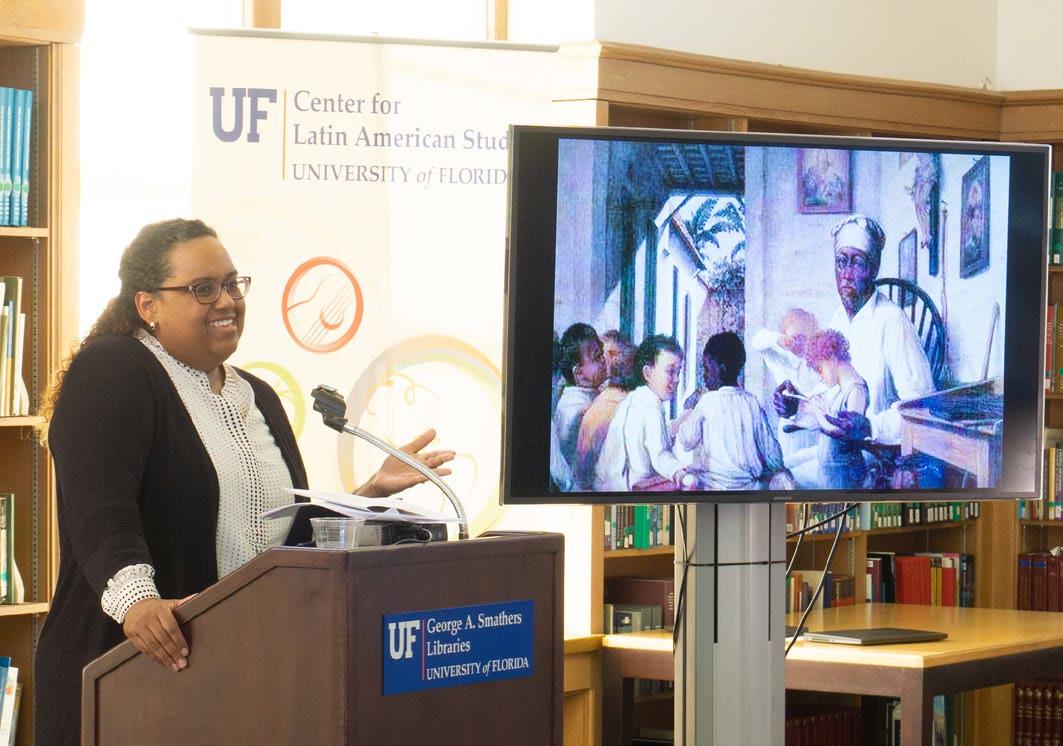
8 minute read
New perspectives, deeper understandings
New perspectives, deeper understandings
Interactions with Spring 2023 Bacardi Family Eminent Scholar Solsiree Del Moral spark student reflection on identity, belonging, and migration
Advertisement
BY MARICARMEN TORRES MEDINA

Maricarmen Torres Medina (MALAS 2023)
This semester I had the privilege to work with Solsiree Del Moral, the Bacardi Family Eminent Scholar visiting the Center for Latin American Studies during the semester of Spring 2023. My first encounter with Solsiree was impressive. She is very tall! But not only that, she has a presence that comes from what I think is her initial serious face and her height combined. She also speaks very articulately and with confidence. Interestingly though, this facade melts away as soon as she sits down with you. Solsiree is very attentive. She follows your conversation with all her face. She listens, she smiles, and then she asks for more. Her reflectiveness is palpable, and she does well in bringing her interlocutors into this exercise of active listening and thinking.
During our first conversation, I found out she was a fellow Puerto Rican. She told me: “But I am a Puerto Rican from here.” I knew what she meant, and why she clarified. I felt bad for her having to do so. What she meant is that she is not from the island. Then, she shared her connection to the place. Her family is from the southern part of the island, from Arroyo, where the guttural “r” is very prevalent, when “carro” (car) is spoken almost like a French person learning Spanish. It reminded me of the way my mother and aunt speak; they are also from the southern part. But why the clarification, you must ask yourself... Here there is the silent understanding amongst us Puerto Ricans— born on the island or not—that, notwithstanding the pride we all carry about our flag, for our sports teams in international competitions, about our music... something still separates us. As our conversation was carried away entirely in English, I knew that one of the main distinctions she implied was the language.
Although Puerto Ricans have been U.S. citizens since 1917 through the Jones Law, our first language is Spanish. We have a long history with the U.S. since its arrival in 1898, when an Americanization project was put into place but the cultural and linguistic assimilation simply failed. Therefore, the Puerto Ricans who “are not from the island,” that either were born or grew up in the U.S., might not speak Spanish, or, if they do, might not do it fluently, or might not feel confident enough to express themselves fully in the language.
Growing up in Puerto Rico in the 90s, I started to see a change in how “Puerto Rican-ness” was understood. Migration has always been part of our culture—something we share with fellow Caribbean islands—where we are either forced or compelled to migrate for a short period, and in other cases, in a more permanent way, for obtaining job opportunities, education, or even security. There is something about how our Caribbean states are built that is dependent on our geography, which is a kind of burden to our economic development and growth: limited goods, mobility, isolation from other countries, etc. I used to listen to adults tell me that an undeniable proof of one’s origin—therefore identification—is to be born in the same place one claims to come from. Therefore, through that rationality, the people who claim to be Puerto Ricans but who were not born on the island, and did not speak Spanish, could not be considered “real Puerto Ricans.” They would say: “They are Nuyoricans.” But that is a terrible misunderstanding of our history and a sign of a very cheap and ongoing nationalism. Understanding migratory phenomena is to understand the shades of gray. The connection to language, culture, and territory is mediated by different aspects. It is in the precise conflict of definitions and identities that one might be able to grasp the richness of the debates.

Solsiree Del Moral answers questions during her COLOQUIO talk
Solsiree’s scholarship has centered on the study of Latin America and the Caribbean, with a special interest in Puerto Rico. Her choice of topics concentrates on race, colonialism, and education. Her most recent research focuses on studying street children between the 1900s and 1960s, whom she identifies as “a heterogeneous group including the homeless children who worked and slept in the streets as well as the housed poor and working-class children who earned wages in public spaces.”
During my work with her, I was able to collaborate with her on a new project that follows this research, but expands the timeline of the archival materials and also takes into consideration legal processes against the state by the parents of some kids who were subjected to the juvenile judicial system. At her coloquio this semester, she presented the topic “Los Olvidados” (“the Forgotten”) centering on the analysis of the welfare and institutional care of these “niños realengos” (“street children”) in Puerto Rico. Her presentation and research is rich in archival materials, including articles from Puerto Rican newspapers as well as photography of some of the street children. Although her work will show the structural limitations of the governing class in Puerto Rico regarding child welfare and care, in her methods she hopes to highlight stories of the children themselves. For example, she shared with me that the kids were able to, in many cases, trick the system by saying that they were too young to be incarcerated, or that the street children were often able to develop their own communities of support in a non-hierarchical manner.

Solsiree Del Moral delivers her keynote presentation, “Race, Education, and Empire: La Familia Cordero”
Throughout her time at the Center, Solsiree also taught the course “History of Afro-Latin America.” The class was composed mainly of first-generation migrants and second- or thirdgeneration sons and daughters of Latin American migrants. I had the opportunity to join them during their last class, as they ended on the theme of “Diasporic Belonging.” They were discussing the book “Racial Innocence: Unmasking Latino Anti-Black Bias and the Struggle for Equality,” written by Tanya Katerí Hernández. Solsiree guided the group through Socratic-style discussion, as we talked about the author, explored how the book differed from other texts, and posed questions about the arguments.
During the discussion, I realized something: my understanding of racial relationships was limited to the very local experiences of Puerto Rico, and the implications of the U.S. political treatment of the island within its territorial limits and social dynamics. Latinos who were born or grew up in the U.S. are subjected more closely to the racial inequalities, and legal and social barriers that are prevalent in the country. In the U.S. the history of racial segregation has shaped the way those relationships have transformed through time. Taking this into consideration, I was able to further understand why within the diasporic experiences in the U.S. a particular vocabulary is used that might differ from the way we describe racial relationships in Latin American countries, by contrast.

Solsiree Del Moral moderating the conference panel Estrategias Afro-diaspóricas para la educación
At the end of the class, I did feel out of place—but in a good way. This is the “out of place” that keeps you uncomfortable and pushes you to sort it out. When the time was up, Solsiree took her books and water bottle and said farewell to the class, with a smile. The students smiled back. After class they shared with me that Solsiree’s class challenged them, that it made them uncomfortable in the good way, too. Some of them had discovered or confirmed why intersection was an important way of approaching these topics.
Ultimately, engaging with professors and students from different backgrounds across Latin America and the U.S. has the power to shift our understanding of our identities within our contexts. Solsiree’s presence during my MALAS experience connected me more with Puerto Rico and its often-misunderstood diasporic relationships. It made me realize I am drawn to the study of the Caribbean, even though I was trying to ignore it during my time in MALAS because I thought that it would be more productive to distance myself from the region that I experienced firsthand. And although that opened the doors to understanding phenomena in other places, at the same time, I realized that the Caribbean is not always a strong focus in Latin American Studies programs.
Reflecting on these interactions with Solsiree and her students made me think about a debate that is constantly pushed forward in Latin American Studies: who has the right to study and write about topics and themes? There are great aspiring scholars from all over the world interested in Latin America, who were not born in Latin America and the Caribbean, but whose passion and commitment to push forward research in the region is infinite. Or do they not “have the authority” to speak of direct concerns, to push forward research, to engage with topics, because they have not lived an experience firsthand? The beauty of empathy is that it is the fire that pushes toward across borders and boundaries, toward understanding and solidarity.
Communities are built by recognizing our reach and limitations when we are able to succeed and fail together. As I part now from Gainesville, with Solsiree also leaving the Center behind, I will miss her deeply. She has made me feel more comfortable continuing my studies in Latin America with a little bit of distance—which always gives perspective—and recognizing my limitations and being humble about them. ◆










